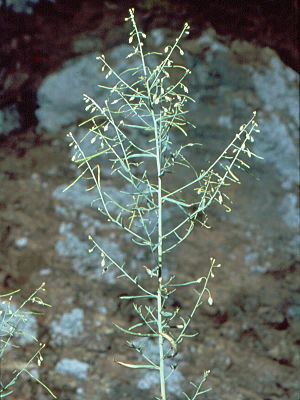Shale barren rockcress facts for kids
Quick facts for kids Shale barren rockcress |
|
|---|---|
 |
|
| Conservation status | |
| Scientific classification | |
| Genus: |
Arabis
|
| Species: |
serotina
|
The Arabis serotina, also known as the shale barren rockcress, is a very rare flowering plant. It belongs to the mustard family. This plant grows naturally only in parts of eastern West Virginia and western Virginia. It is found in and around the Shenandoah Valley. There are fewer than 60 groups of these plants left.
The shale barren rockcress is special because it only grows in a unique place called shale barrens. These areas have steep hillsides made of bare shale rock. This type of habitat is very dry and hot. Many unique plants, like Allium oxyphilum and Taenidia montana, live only in these shale barrens. The shale barren rockcress is one of the rarest plants found there. It is listed as a federally endangered species, meaning it is at high risk of disappearing forever.
Contents
What Does Shale Barren Rockcress Look Like?
This plant is a biennial herb, which means it lives for two years. In its first year, it grows a small, flat group of leaves close to the ground. This group of leaves is called a basal rosette and is only a few centimeters wide.
In its second year, a straight, branching stem grows up from the plant. This stem can reach almost one meter (about 3 feet) tall. The leaves on the stem can be 5 to 15 centimeters long. They are shaped like a spearhead and sometimes have small teeth along their edges. These leaves often dry up and fall off early, so the plant might have few or no leaves when it flowers.
The plant produces several tiny white flowers. Each flower is less than one centimeter wide. They grow in a cluster called a raceme. After flowering, the plant makes a fruit called a silique. This fruit is 4 to 8 centimeters long and holds many small seeds.
Where Does Shale Barren Rockcress Live?
This endangered plant lives in the mid-Appalachian shale barrens. This habitat is made of eroding shale scree, which are loose, broken rocks. These rocks formed a very long time ago, in the Devonian period.
This special habitat is found within Virginia pine woodlands. The ground is made of unstable rock and thin soil. This soil is mostly weathered pieces of shale, called channery. Most groups of the shale barren rockcress have only a few individual plants. The rocky soil gets direct sunlight, making it very hot. Temperatures can reach up to 63 degrees Celsius (145 degrees Fahrenheit). Because it's so hot, not many plant species can survive there.
Why Is This Plant Endangered?
The shale barren rockcress was officially listed as a federally endangered species in 1989. In Virginia, it was given a "Critically Imperiled" ranking in 1991. This means it is in extreme danger of becoming extinct.
Threats to the Shale Barren Rockcress
- Declining Pollinators: The plant is pollinated by a butterfly called the grizzled skipper. The number of these butterflies is going down. In some areas, this decline is due to the use of a pesticide called Dimilin. This pesticide is used to control the gypsy moth. Fewer butterflies mean fewer plants can be pollinated and make seeds.
- Habitat Loss: The shale barren habitat where this plant lives is being lost. This happens because of new construction, such as railroads, hiking trails, and dams. When these are built, the plant's home is destroyed.
- Deer Browsing: Many groups of the plant are heavily eaten by deer. When deer eat too many plants, it makes it harder for the plant to survive and reproduce.
- Competition from Other Plants: The shale barren rockcress struggles to compete with plants that are not native to the area. These include barren brome and tree of heaven. These introduced plants can grow quickly and take over the space and resources that the rockcress needs.


